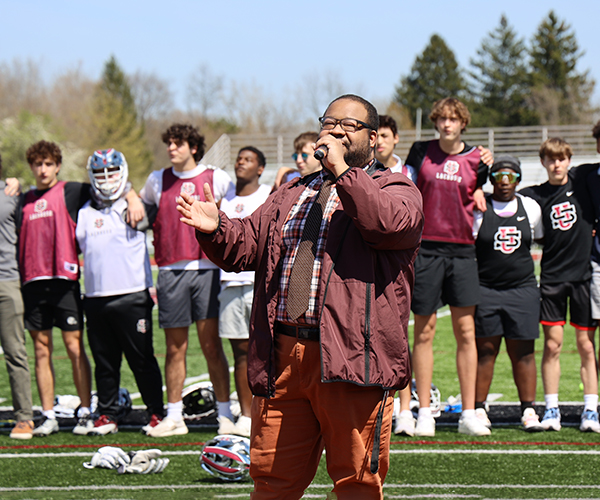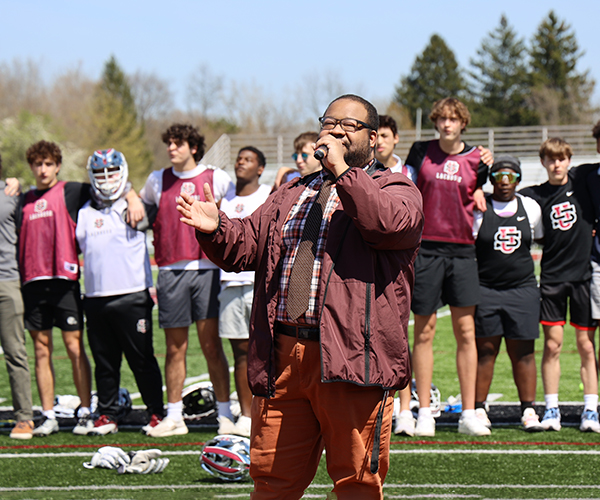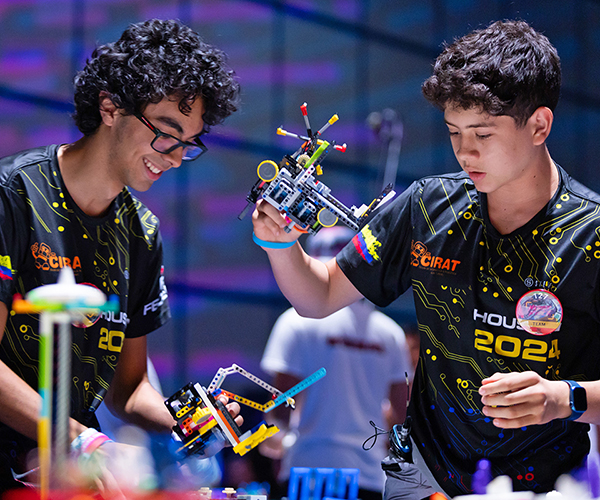|
Explore the Healer Within Sure it's hard to get your kids excited about their health. But not at The Healer Within, a special exhibit at HealthSpace Cleveland that explores the body's remarkable ability to protect — and in many cases heal — itself. The show illustrates the body's protective and healing mechanisms with colorful displays, high-tech interactives and hands-on activities that get kids thinking and their blood pumping. With more than 30 exhibit kiosks, the show includes a skeleton riding a bicycle; Athena, a transparent woman whose organs light up; a "Fantastic Voyage"-like trip through the blood vessels in search of "baddies"; a palm-sized biofeedback device that lets kids turn off lights with their thoughts; and a Cancer Defender video game. The film accompanying the show uses animation, sports teams and sports-medicine docs to reinforce the fact that visitors can tap into their "healer within" to enhance and maintain well-being. |
On top of that, Decates knew Liana didn't have the same experience level as the other child actors who would be auditioning. Her handful of roles had come in community children's theater — nothing the caliber of the Carousel — and those were just background chorus roles. Besides, it was a long drive from their home in Orange to Akron.
But when she arrived home, she found Liana with an updated résumé in her hand, ready to walk out the door.
About 80 children auditioned and Liana, now 11, won the role of Tessie, one of the six orphans, during the show's run from May to July. That meant adding one more activity to Liana's busy schedule of horseback riding, dance, piano and guitar lessons. During the production, Liana performed in eight shows a week, not returning home until about 11 p.m. on school nights and closer to midnight after weekend performances.
Decates' other daughter, Aliya, 15, is an accomplished pianist who plays with The Agnon Five, which means up to two hours of piano practice each day, plus performances. In addition, she competes on a dance team that requires about six hours of weekly lessons and re-hearsals, plus competitions. Aliya also takes horseback riding lessons and recently started volunteering at Field-stone Farm Therapeutic Riding Center in Bainbridge.
"It puts pressure on [our family]," Decates admits. "On the other hand, for some kids, like Aliya, if she doesn't have anything to do, she tends to watch TV and not do much of anything."
With more activities, she's more organized and gets more done, Decates says. "I've found that she actually works hard simply by having more to do and more things that she enjoys."
With two performers in the family, Decates has become a reluctant stage mother. It wasn't what she imagined when she first signed Aliya up for piano lessons at age 5.
"I just decided it might be fun to do piano lessons, because I enjoyed it when I was a kid," she says. "Within about two years, her piano teacher said she was really good."
The scene repeated itself when she signed both girls up for Stagecrafters, a youth-theater program offered through the Orange Community Education and Recreation department. Liana loved it. She was good at it, too.
While Decates never expected her kids to get so much out of their activities, other parents dream of it for their kids. You've seen them parading their dolled-up children in front of an audience at a young age or have witnessed them yelling intensely from the sidelines of a pee-wee sporting event.
Certainly, experts are concerned about parents living out their own unfulfilled childhood aspirations through their kids. But not allowing children to participate in activities that their friends do can also create issues.
"Especially among more affluent families, this is the way kids are from a very young age," says Carolyn Landis, a clinical psychologist at Rainbow Babies and Children's Hospital and an assistant professor in the division of behavioral pediatrics and psychology at Case Western Reserve University. "Infants are going to the Little Gym and they're doing Kindermusik classes. They're doing dance and sports teams. And if you don't have your child in those activities, that may work out fine. But you have to think about if your child is going to feel different from their peers and at what point is that going to kick in, and is that going to be a problem for your child?"
So what's a parent to do?
"You need to consider the child's cognitive abilities, the child's attention, concentration, his or her emotional maturity, as well as how motivated or interested the child is in being involved," says Gerard Banez, a pediatric psychologist at The Children's Hospital at The Cleveland Clinic Foundation. "Kids as young as 4 or 5 can do well with dance or sports, but there are kids who aren't ready at that age. It's important to really consider each child as an individual."
Banez cautions that you shouldn't put a child in an activity just because a neighbor is doing it or a sibling was involved in it at the same age.
Still, most experts agree that some form of organized class or sport provides kids with skills that benefit them in the long run, including confidence, self-esteem, making friends, working in a group and listening to other adults.
In fact, recent studies have shown that involved teen-agers usually don't get into as much trouble as their peers who aren't involved in extracurricular activities.
A 2004 Women's Sports Foundation study titled "Her Life Depends On It" shows that the majority of girls involved in sports use significantly fewer drugs, smoke less often and are less likely to be sexually active.
Perhaps most astounding in the study is that girls and boys involved in sports spend more time on homework and are enrolled in more math, science and honors classes than their nonathletic peers.
Katie Kerr, program director at the West Park Family YMCA, played sports throughout her life, including attending Assumption College in Wooster, Mass., on a basketball scholarship.
Today, she runs the Y's youth-sports department for children ages 3 to 13. It's critical to keep things fun and noncompetitive at a young age, Kerr says, and to emphasize that to parents, as well.
In her programs, every child plays the same amount of time regardless of ability and score isn't kept until the 9-to-12 age group. "At that time, they're starting to understand that it is a competitive world and that things do involve competition," she explains. "We put the scoreboard on, but we don't harp on it."
|
To Quit or Not to Quit, That is the Question Your daughter tells you she doesn't want to go to dance class. Your son wants to drop out of baseball. Should you let them quit or make them continue? Here are a few tips. 1 Listen to your child before making a decision. "Because I don't want to" doesn't cut it as an excuse for quitting in the middle of a sports season or semester of dance lessons. But some children, especially older ones, often have valid reasons for wanting to leave an extracurricular activity. Hear your child out before making a decision. 2 Get involved to see the issues firsthand. If your child complains about a coach, see if you can volunteer as an assistant so you can witness the dynamics firsthand. Younger children may simply want the comfort of a parent nearby and might be happy to remain in the activity once the parent volunteers or stays to watch classes. 3 Encourage a change, instead of quitting. Your child might have a perfectly good coach or dance at a fine studio, but something just doesn't mesh. Or it may be that you believe adamantly in the activity, but your child's personality is more suited to guitar lessons rather than piano, tap instead of ballet or playing in a recreational league instead of on a travel team. Consider all options before just walking away. 4 Don't be afraid to say no in the short term. "In general, I think it's important for kids to finish out a season, or if they're enrolled in a session of dance lessons or art classes," says Gerard Banez, a pediatric psychologist at The Children's Hospital at The Cleveland Clinic Foundation. To avoid the question coming up, Banez suggests that before even starting an activity, you make it clear that you expect your child to finish out the season or a certain number of months or years of music or dance lessons. 5 Don't be afraid to say no in the long run, either. Shirley Morgenstern, owner of Morgenstern Dance Studios in Beachwood, can't recall how many children who quit taking lessons when they were young return as teens to ask, "Why did you let my mother let me quit?" She adds that there's nothing wrong with insisting that a child take music lessons or play sports. You insist they go to school, right? "You try to help them understand how important it is and try to encourage them and give them the joy for learning. It's the same thing with activities." 6 It's OK to quit when you realize it's your agenda and not your child's. If your child really hates an activity, think about why you enrolled them in the first place. Is it because you like to hang out with other parents? Or because you never got the chance to play sports as a kid? Or because you wanted to sing and dance? If the agenda is inappropriately the parent's, let the child follow her heart and discover what she really likes to do. 7 It's OK to quit when there are negative teacher or coach behaviors. Banez says it's appropriate to let a child quit if the coaching is too harsh or critical or if the coach/instructor engages in unsafe or dangerous behaviors. 8 It's OK to quit when there's a dramatic change in your child's behavior. "A child could withdraw, lose his appetite, act sad — or it could come out the other extreme, where the child is just hyped up, acting out, acting angry," says Carolyn Landis, a clinical psychologist at Rainbow Babies and Children's Hospital and an assistant professor of pediatrics at Case Western Reserve University Medical School. 9 It's OK to quit when the activity gets in the way of real life. If the activity interferes with the child's sleep and ability to complete other responsibilities, such as household chores or homework, then it's OK to step back. Similarly, if it puts too much pressure on family time or finances, that's the time to re-evaluate. "Each and every family is different in terms of how much they can be involved in," says Banez. "When it begins to stress the parents out, that's not good either." |
When a child does move to a competitive league, it's important for parents to consider the child's feelings about the sport.
"You can put two kids on the same team, in the same situation and in one kid it fosters connection, belonging and self-respect. In the other kid, it's the wrong place and he suffers stress, anxiety and isolation," observes Dr. Steven Wexberg, a pediatrician at The Cleveland Clinic's Beachwood Health Center.
In addition, Banez points out that up to 80 percent of kids drop out of sports by the time they reach age 12. "That's not necessarily bad since, over time, kids get a better sense of what they're interested in, so maybe the figures reflect that," he says. "But what I do fear is the number of kids are dropping out over time just because they've burned out. They've decided they can't take the pressure or involvement or they're bored with the activity because they've had too much of it."
How do you know when your child's reached that point or when she needs to be pushed a little?
"When you have a child, you don't leave certain things all up to the child as you're raising them," says Shirley Morgenstern, owner of Morgenstern Dance Studios in Beachwood. "You try to help them discover the proper way to do things and help them discover the joy of accomplishing different things in their life."
Those things, Morgenstern says, should include exposure to music at a young age. Dance helps a child develop self-confidence, while music gives them an appreciation for the arts. It may do even more than that. A study at the University of California-Irvine showed that music lessons for preschoolers helped them develop spatial awareness and made them better at math.
Morgenstern and her husband, Carl Topilow, conductor of The Cleveland Pops, began playing Broadway show music for their daughter, Emily, when they adopted her from Russia at 20 months. At 3 1/2, she started dance lessons. Emily, now 7, also began piano at a young age. But then she wanted to quit.
"I told her, •It's not really an option,' " says Morgenstern. But she did listen to her daughter and agreed to switch her to Suzuki violin, a better fit for Emily's energetic personality.
That's one of the best things a parent can do: Consider the personality match of the activity and the child. The other, says Morgenstern, is to find incentives to motivate the child to practice and stick with it.
"It's a battle to practice. You can't let that stop you," advises Morgenstern. "Find incentives. Five stars for the week and you get an extra play date or dollar for your allowance. It's a battle to get kids to do homework, too."
She also recommends keeping practices short, but consistent. Fifteen or 20 minutes every day is better than an hour sporadically.
Parents should also help their child find a balance in his life, Wexberg adds. For the child who doesn't want to do anything, a parent should give a choice of activities, but insist that he try something.
"I think there is a general belief that the more activities the kids are involved in, the better for the kid," says Banez. "The more activities, the more the kid's going to learn, the more they're going to improve, the more successful they're going to be. But I really don't believe that's necessarily the case for all kids. There are some kids who thrive on multiple activities, while others don't."
If a child wants to pursue a single activity seven days a week, Wexberg recommends the parent insist that at least one day a week be spent doing something different, such as going to church or temple, doing community service or working in a garden.
It's not only important to find a balance in each child's life, but within the family structure and the parent-child relationship. For example, some families thrive on the time they spend together on the road with a child in a competitive-sports travel team. Others find the financial pressures and time demands damaging to the family, particularly to other siblings who might have to sacrifice their own activities.
Remember, say the experts, there's nothing wrong with just letting children play — or, better yet, getting down on the floor to play with your small children yourself or going out for a hike as a family.
"It's almost like parents want their times to be organized in all these little slots," says Landis. "Some parents are anxious if they have an afternoon to just hang out with their kids. It's almost like they don't know what to do anymore. I worry about creativity suffering when children are not coming up with games on their own."
Wexberg says that it's important that parents reflect on whether a child needs to do a particular organized activity or if just playing together would work.
"Catch your breath, sit down, spend a few minutes and ask yourself, Am I taking them to this activity because it's enriching and enlivening for him right now?" he says. "Am I doing it because it's easier than being engaged personally? Am I doing it because everyone else is? Am I doing it because I'm afraid he's going to fall behind?"
Perhaps the best advice for parents to remember is that children will discover their talents and passions in time.
"Some children can be very young and show an affinity for something, while there's other children who can even be in high school and happen upon a skill in art or music that they didn't necessarily know they had," says Landis.
After all, even Michael Jordan was cut from the basketball team his freshman year of high school ... and look what happened to him!



